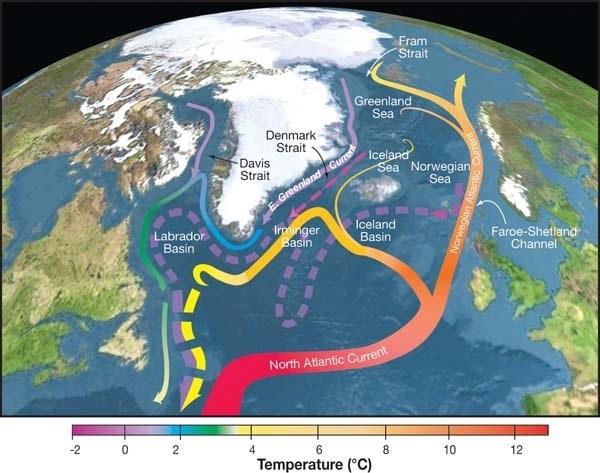
The Gulf Stream system could collapse as soon as 2025, a new study suggests. A collapse would bring catastrophic climate impacts but scientists disagree over the new analysis, informs ‘The Guardian’.
The shutting down of the vital ocean currents, called the Atlantic Meridional Overturning Circulation (Amoc) by scientists, would bring catastrophic climate impacts.
Amoc was already known to be at its weakest in 1,600 years owing to global heating and researchers spotted warning signs of a tipping point in 2021.
The new analysis estimates a timescale for the collapse of between 2025 and 2095, with a central estimate of 2050, if global carbon emissions are not reduced. Evidence from past collapses indicates changes of temperature of 10C in a few decades, although these occurred during ice ages.
Amoc carries warm ocean water northwards towards the pole where it cools and sinks, driving the Atlantic’s currents. But an influx of fresh water from the accelerating melting of Greenland’s ice cap and other sources is increasingly smothering the currents.

A collapse of Amoc would have disastrous consequences around the world, severely disrupting the rains that billions of people depend on for food in India, South America and west Africa. It would increase storms and drop temperatures in Europe, and lead to a rising sea level on the eastern coast of North America. It would also further endanger the Amazon rainforest and Antarctic ice sheets.
Research in 2022 showed five dangerous tipping points may already have been passed due to the 1.1C of global heating to date, including the shutdown of Amoc, the collapse of Greenland’s ice cap and an abrupt melting of carbon-rich permafrost.
The new study, published in the journal Nature Communications, used sea surface temperature data stretching back to 1870 as a proxy for the change in strength of Amoc currents over time.
Prof Niklas Boers, from the Potsdam Institute for Climate Impact Research in Germany, revealed the early warning signs of Amoc collapse in 2021. “The results of the new study sound alarming but if the uncertainties in the heavily oversimplified model [of the tipping point] and in the underlying [sea temperature] data are included, then it becomes clear that these uncertainties are too large to make any reliable estimate of the time of tipping.”
Prof David Thornalley, at University College London, UK, agreed the study had large caveats and unknowns and said further research was essential: “But if the statistics are robust and a relevant way to describe how the actual Amoc behaves, then this is a very concerning result.”
Dr Levke Caesar, at the University of Bremen, Germany, said using sea surface temperatures as proxy data for the strength of the Amoc currents was a key source of uncertainty: “We only have direct observational data of the Amoc since 2004.”
The extrapolation in the new analysis was reasonable, according to Prof Tim Lenton, at the University of Exeter, UK. He said the tipping point could lead to a partial Amoc collapse, for example only in the Labrador Sea, but that this would still cause major impacts.
read more in our Telegram-channel https://t.me/The_International_Affairs

 9:34 30.07.2023 •
9:34 30.07.2023 •






















